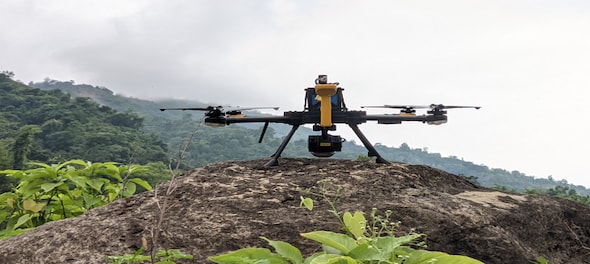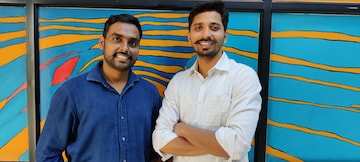
Vipul Singh and Suhas Banshiwala met at IIT Kanpur, where Vipul was a research associate in unmanned aerial vehicles (UAVs) and Suhas had completed his B.Tech and M.Tech in electrical engineering. Vipul had completed his B.Tech in aerospace engineering from Amity University in Noida. It was a meeting of minds and the ecosystem at IIT Kanpur that helped them start Aarav Unmanned Systems (AUS) in 2013. Their venture was incubated at IIT Kanpur and moved to Bengaluru in 2016. Vipul says his expertise was in systems engineering, while Suhas' was in robotic and drone control systems. They were working together on various projects and started discussing ideas beyond the scope of their work. At that point, drones were being used only for limited purposes, that too only in defence applications. But they realised that technology will advance and drones will gain greater acceptance in civilian applications too.
First-principles approach
The two decided to start from scratch instead of looking for examples from abroad and developing their idea. They started noting down all the possible use cases for drone technology, areas and sectors that are heavily manned operations and where technology can disrupt the way things are done. "From then on, we started listing down various applications that will evolve, when they will evolve and what kind of technological pieces will be required to be developed so that it becomes feasible," says Vipul, who is the CEO of Aarav Unmanned Systems. Suhas is its CTO.
According to Vipul, they listed out the areas that they believed drones would play an important role in. They felt that the adoption of drone technology would be the fastest in three sectors – surveying and mapping, or remote sensing; industrial asset management; and, agriculture, particularly precision agriculture. They further broke down the use cases, what problems needed to be solved and can be solved using drones, what would be the benefits, especially in terms of cost and time for those adopting the technology.
In their interactions with various potential users, they met with a lot of scepticism, but Vipul says they spent a lot of time trying to convince the stakeholders, including investors, potential employees and users. "We decided we will develop the entire technology in-house," says Vipul. Buying off-the-shelf would have increased the costs, and it would have become like the defence sector and hence would not have become a big solution. Vipul has an interesting sidelight on their venture's name itself. They decided on the name Aarav, which he says has different meanings in Sanskrit. At the time they formed their company, it wasn't yet a popular name for babies. Soon after, they realised that Aarav was an extremely popular name for babies, especially among celebrities, and now they refer to their company as just AUS.
Getting the prototype ready
According to him, they started working on applications on remote sensing and had a prototype within two years. Potential users were still sceptical because they had not heard of drones being used for remote sensing applications. They took some time to raise funds mainly because the hardware business was considered tough to do in India. They managed to convince some good investors, hit the market with their first product and convince the Adani Group as their first customer for mapping the Mundra port in Gujarat. Their next customer was L&T Infra for which they helped map a freight corridor in western Uttar Pradesh. "We could realise that this technology is going to add a huge value to the economy when it comes to complex applications like managing our infrastructure projects and natural resources. We could also realise that this is going to solve centuries-old land records problem," says Vipul.
If you look at the present situation, points out Vipul, thousands of villages are being mapped using drones under the SVAMITVA (Survey of Villages Abadi and Mapping with Improvised Technology in Village Areas) Scheme of the government of India to get land records right. Large public sector companies such as ONGC, IndianOil, Coal India, NTPC and PowerGrid, and private sector companies including L&T, Tata Steel, Aditya Birla group, Vedanta, JSW and Adani are integrating drones with their process of asset inspection and management. This ensures faster and more accurate inspection and audit of the assets. AUS is also working with various state governments for different projects. "We have mapped more than 40 cities, covered close to 10 lakh hectares for irrigation projects and above 120 opencast mines," Vipul says.
 AUS founders.
AUS founders.Pivoting the business
Vipul says, as a company, they pivoted in 2018 from being just a hardware product provider to offering their customers a complete solution. AUS realised that most of the enterprise customers were finding it difficult to understand the mass of data that was thrown up when drones were deployed. Vipul says they realised that they had to provide complete end-to-end solutions for their customers – deploying the drone and analysing the data that was generated. AUS started integrating data as part of the analytics. "Our USP is the data accuracy and that is the reason we are one of the biggest contributors to the SVAMITVA project. We have the mandate to deploy more than 100 drones. These drones are active in different parts of the country helping Survey of India conduct the SVAMITVA project in the most efficient manner," says Vipul.
Growing the team
AUS has a 70-member team now and will be expanding its team size over the next few months to 100. Vipul is confident that the company will be a leader in the enterprise drone application space. "As an organisation, we see there will be a couple of enterprises that will do a public offering in the drone sector in the next three-five years. I won’t shy away from saying that we are confident that we will be one of them." AUS, he adds, has been more than doubling its revenues every year for the last four years and is profitable. The order book is healthy and with the government taking steps to promote drone manufacturing in the country, he is confident that the orders will only increase. According to him, AUS has raised about Rs 21 crore ($3 million) from investors such as 3one4 Capital, GrowX, 500 Startups, StartupXseed and Valpro and is looking to raise more funds to grow the business and expand manufacturing capacity. At present, the company can make about 100 drones a month. These drones can be sent up to two km from the launch point, cover 125-150 hectares in a single flight, be airborne for 45 minutes and weigh 3.5 kg.
Right now it is all work for Vipul, but when he finds the time, the 31-year-old would like to go out with his friends or cook or trek, read books on strategy and economics. He does find time, however, to go for a run or a walk with his pet Boxer.
—N Ramakrishnan is a Chennai-based freelance journalist with over three decades of experience. The views expressed are personal.
(Edited by : Jomy Jos Pullokaran)
First Published: Oct 23, 2021 2:02 PM IST
Check out our in-depth Market Coverage, Business News & get real-time Stock Market Updates on CNBC-TV18. Also, Watch our channels CNBC-TV18, CNBC Awaaz and CNBC Bajar Live on-the-go!


Telangana CM violated poll code, defer Rythu Bharosa payment, says Election Commission
May 7, 2024 9:01 PM
Lok Sabha Election 2024: How Indian political parties are leveraging AI
May 7, 2024 6:59 PM

